Tennessee Gov. Bill Lee delivers seventh State of the State address
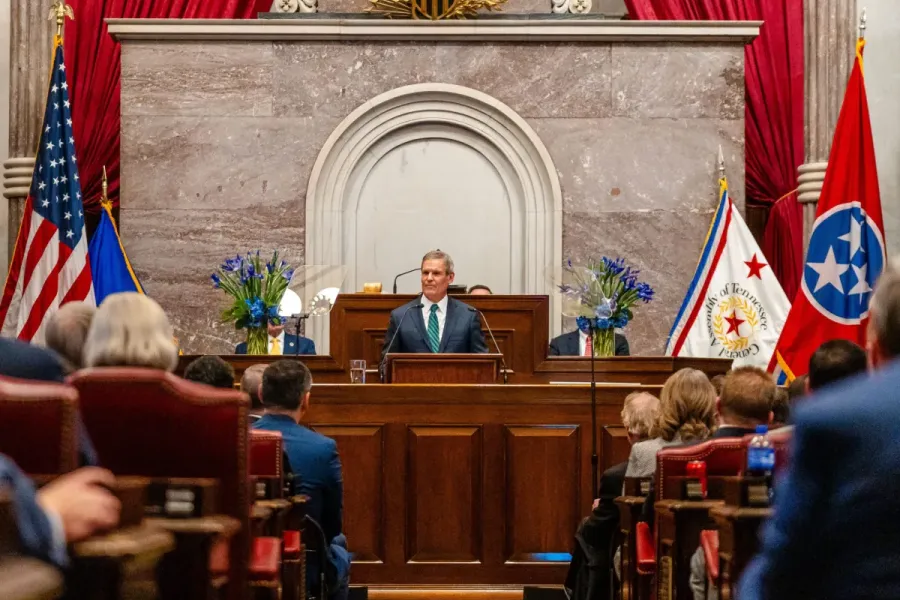
Tennessee Gov. Bill Lee delivered his seventh State of the State address to a joint session of the General Assembly in House Chamber of the Tennessee State Capitol.
Prior to the speech, Lee’s office also released a preview video that highlights the state’s incredible success and bright future. The theme of Lee’s address was “Tennessee Innovates,” encouraging taking new approaches to success for the state.
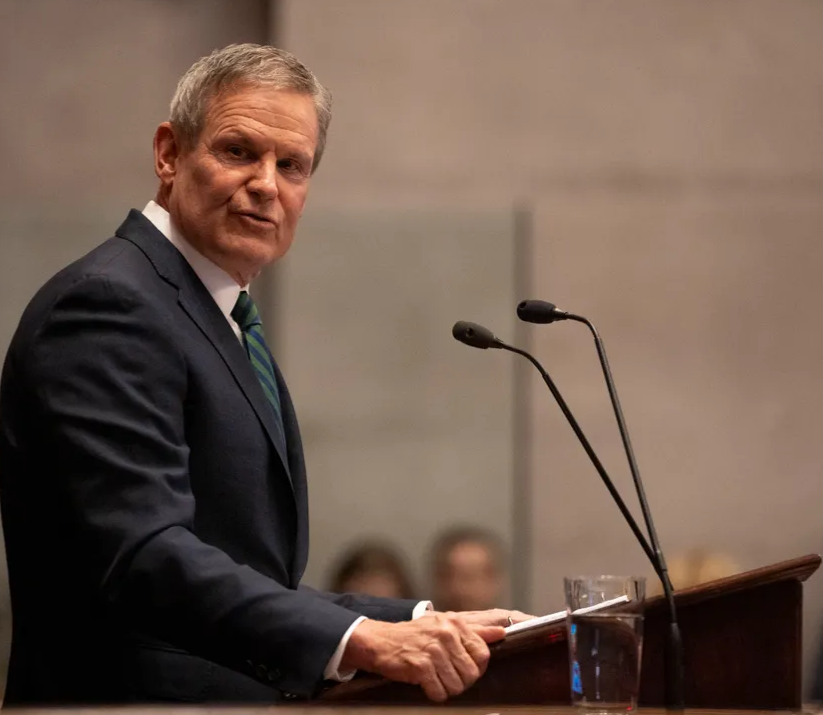
“2025 should be the year to think bigger and to think boldly about what’s possible, and go there,” Lee said. “If Tennessee has led the nation as a beacon of opportunity, security and freedom, why can’t we be the nation’s capital of innovation too? Somebody is going to determine what the future looks like. That should be Tennessee. Just like a business innovates to better serve their customer, or as science innovates to save lives, or as an athlete innovates to change the game, this is a time for us to innovate to create a brighter future for Tennesseans.”
Lee highlighted ways the state is already innovative, such as how it adapts to emerging industry and works to make government more efficient.
“I’ve been saying for years – the state with the workers will win every time,” Lee said. “That is even more true today. Together, over the last six years, we have recruited more than $37 billion in capital investment that has resulted in 234,000 new jobs. Tennessee is a top contributor to our nation’s economy because of our willingness to adapt and welcome emerging industries. Limited government is knowing how to do more with less. More bureaucracy does not mean better service. Businesses already know this – government should do the same.”
This success in business and the state’s influx in new residents, leading to housing concerns across the state.
“Once again, U-Haul has ranked Tennessee among the top five most moved-to states,” Lee said. “Ninety of our 95 counties are experiencing population growth. While it’s a point of pride, it’s also a call to action. Whether you’re born in Tennessee or choose to move to Tennessee, we want you to stay in Tennessee…Our state needs a housing plan that makes this key part of the American Dream possible.”
One of Lee’s initiatives is to grow the state’s nuclear industry as a way of tackling emerging energy issues.
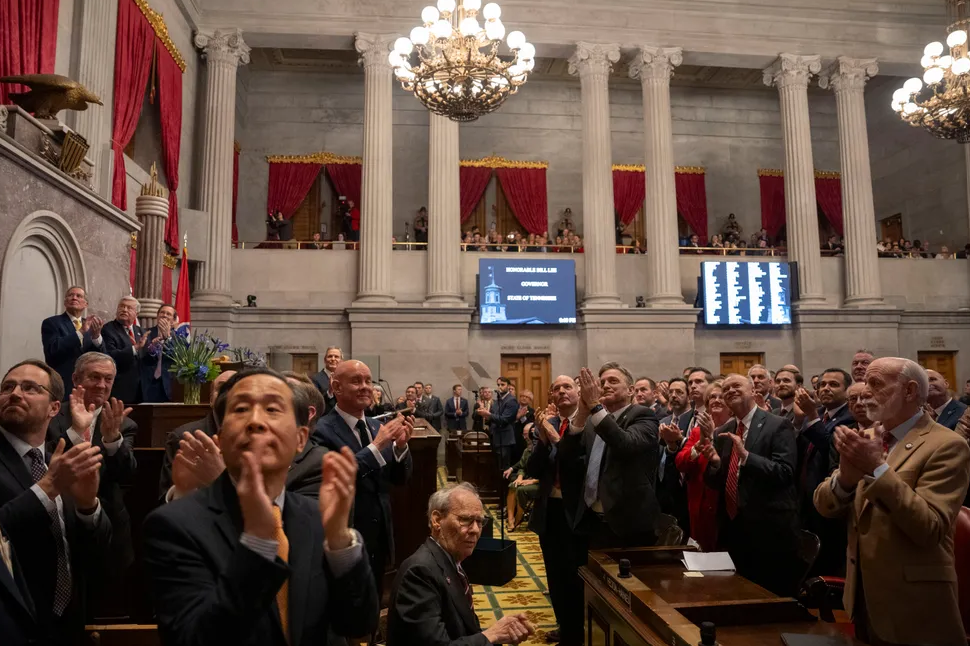
“The Volunteer State is on track to be the epicenter of energy innovation, and it couldn’t happen at a more crucial time,” he said. “For the past few years, Washington has prioritized social agendas over practical energy policy. As a result, we’re staring down the barrel of an energy crisis with an electrical grid that is on the fragile verge of being completely overwhelmed…So, Tennessee’s ambition to lead in nuclear innovation is much bigger than just competing with other states. This is about securing the future of America.”
Lee also committed to preserving natural resources and balancing the state’s growth to do so.
“From the Delta to Appalachia, Tennessee is blessed with natural abundance that we have to protect and preserve for future generations,” he said. “Yet, we also continue to be one of the fastest-growing states in the nation – in rural and urban areas alike. So, how do we balance record growth with a plan to protect our natural resources? You start by rejecting conventional wisdom that says you cannot do both. To grow Tennessee, we have to conserve Tennessee.”
Notable highlights from the governor’s $59.5 billion budget include:
Economic Opportunity & Tax Relief
- $35.6 million investment in Tennessee’s Rainy Day Fund, bringing Tennessee reserves to nearly $2.2 billion, the largest in state history
- $7 million to expand the Tennessee Youth Employment Program to operate year-round, double its participation, and reach even more underserved communities
- $45.8 million for Rural Development Grant Fund to enhance Tennessee’s rural and distressed communities through site development, community asset improvements, strategic planning and downtown revitalization
- $25 million for FastTrack grants to recruit new business to Tennessee and support workforce development
- $6.3 million to create a statewide Micro-Credentialing Program to develop short-term, targeted certifications that equip Tennesseans with high-demand skills identified by industry and state partners
- $25 million to expand the RevV Program to connect private companies with Tennessee’s research institutions to drive research and development and job creation
- $5 million to create TN Accelerates, a partnership between Tennessee Economic and Community Development and the Department of Labor and Workforce to create customized workforce training programs tailored to the specific needs of incoming and existing businesses
- $5 million for the Tennessee Entertainment Commission to fund incentive grants to strengthen Tennessee’s music and film industry
- $10 million for the Rural Grant Opportunity Fund to match funding for at-risk and distressed counties seeking state and federal grants
- $10 million for the Small Business Innovation Research and Small Business Technology Transfer Matching Funds to match federal funds assisting Tennessee startups in securing competitive research and development grants
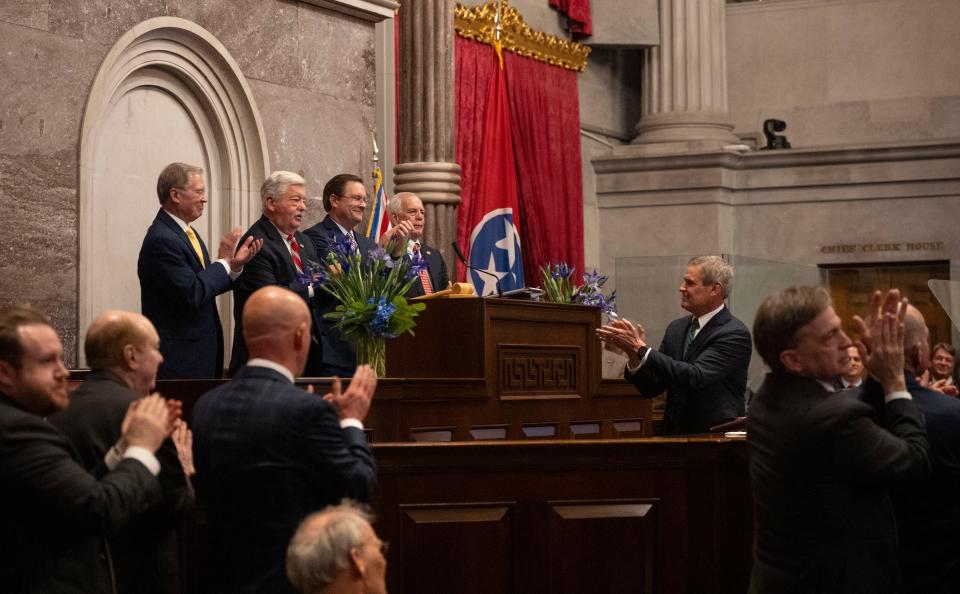
Housing & Infrastructure
- $1 billion to the Tennessee Department of Transportation to address the state’s infrastructure needs, including expediting existing road projects and funding new projects across rural and urban Tennessee
- $60 million to create the Starter Home Revolving Loan Fund to support construction of new, affordable starter homes for hardworking Tennesseans, prioritizing rural communities
- $30 million to fund the Rural and Workforce Housing Tax Credit, making it easier to build homes and businesses
Disaster Relief
During the special legislative session in January 2025, Gov. Lee and the General Assembly appropriated more than $450 million in direct disaster relief as part of a comprehensive plan to support ongoing recovery efforts and allow for proactive preparation for future emergencies. Gov. Lee’s proposed FY25-26 budget includes the following additional investments:
- $4 million to implement and maintain a Mesonet system, which will monitor weather-related and flooding threats in the state
- $3 million to upgrade TEMA’s regional response vehicles
Education
Public Education Investments
- $198.4 million for teacher bonuses in recognition of their hard work and dedication and for leading the nation in student achievement and growth
- $244 million to strengthen education through the Tennessee Investment in Student Achievement (TISA) formula growth, including teacher pay raises
- $62.7 million for K-12 infrastructure and facilities funding
- $27.3 million for summer learning programs to support students between school years
- $25 million further investment in the Fast Growth Fund, to support fast-growing districts
- $17 million for Grade A School Grants
- $10 million to provide paid parental leave for Local Educational Agency employees
Expanding Choices for Tennessee Parents
- $145.9 million for Education Freedom Scholarships, to empower parents with the freedom to pick the right school for their child and have a say in where their tax dollars are spent – regardless of income or zip code
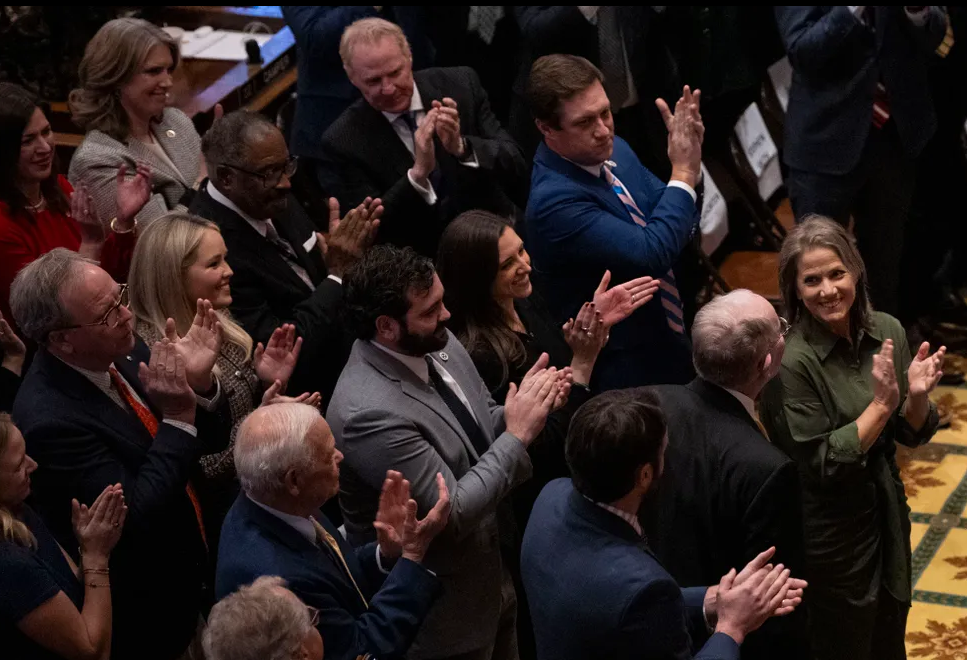
Higher Education
- $12 million to create the TennesseeWORKS Scholarship, a new award that will cover every penny of Tennessee Colleges of Applied Technology (TCAT) tuition and fees for all students while relieving the extra cost burden of tools and equipment for those most in-need
- $52.8 million to fully fund the outcomes-based funding formula, which may be used for program improvements that assist higher education institutions in meeting outcomes including student progression, degree production, research and service, efficiency metrics, and other measures related to institutional mission
- $2.27 million to develop Tennessee Board of Regents’ Center for Workforce Development to expand workforce training for businesses and industries, including specialized onboarding and apprenticeship programs, in partnership with TN Accelerates
- $2 million to create a common application system for Tennessee’s community colleges, streamline student transfer, and implement a statewide customer relationship management system to enhance student outreach and support
Strong & Healthy Families
- $95.5 million utilizing Shared Savings to enhance long term care services and supports for older adults and people living with disabilities
- $41 million to support the Department of Children’s Services (DCS) with placement of children within the provider network
- $7.2 million to expand the WAGE$ Program and reduce turnover in Tennessee’s childcare workforce by increasing pay and rewarding greater education
- $5.9 million to cover childcare for more working families through an expansion of the Smart Steps Child Care Program and ease the benefits cliff
- $24 million to continue a Department of Health pilot program to address unmet dental service needs and increase the number of dentists in Tennessee
- $11.8 million to reduce waitlists in the OPTIONS and Senior Nutrition programs
- $10.9 million to expand programming at the Boys & Girls Club of Tennessee
- $5 million to increase bed capacity at the Middle Tennessee Regional Mental Health Institute
- $3 million for a partnership between Department of Children’s Services (DCS) and Department of Disability and Aging (DDA) to provide additional support services for children in DCS care with intellectual and developmental disabilities
Safe Neighborhoods
During the special legislative session in January 2025, Gov. Lee and the General Assembly passed a robust legislative agenda and appropriated $5 million to prepare Tennessee to assist in implementation of the Trump Administration’s illegal immigration policies. Gov. Lee’s proposed FY25-26 budget includes the following additional public safety investments:
- $130 million further investment in the Violent Crime Intervention Fund to support local law enforcement and local jurisdictions through grants to fund evidence-based strategies to improve public safety
- $75 million to establish Downtown Public Safety grants to increase public safety in downtown areas with businesses and commercial activity
- $38 million in funding for an additional 117 State Troopers and related support staff to improve public safety across the state
- $5 million to further expand the Statewide School Resource Officer (SRO) Program Grant, which places SROs in each K-12 public school and public charter school in Tennessee
- $3.7 million in funding for an additional 22 TBI positions to support victim services, intelligence analysis, aviation, security, Medicaid fraud enforcement, and administration
- $1.3 million in additional funding for Houses of Worship Security Grants
- $1 million to expand the school-based behavioral health liaison program, giving students across Tennessee schools important resources and mental health support
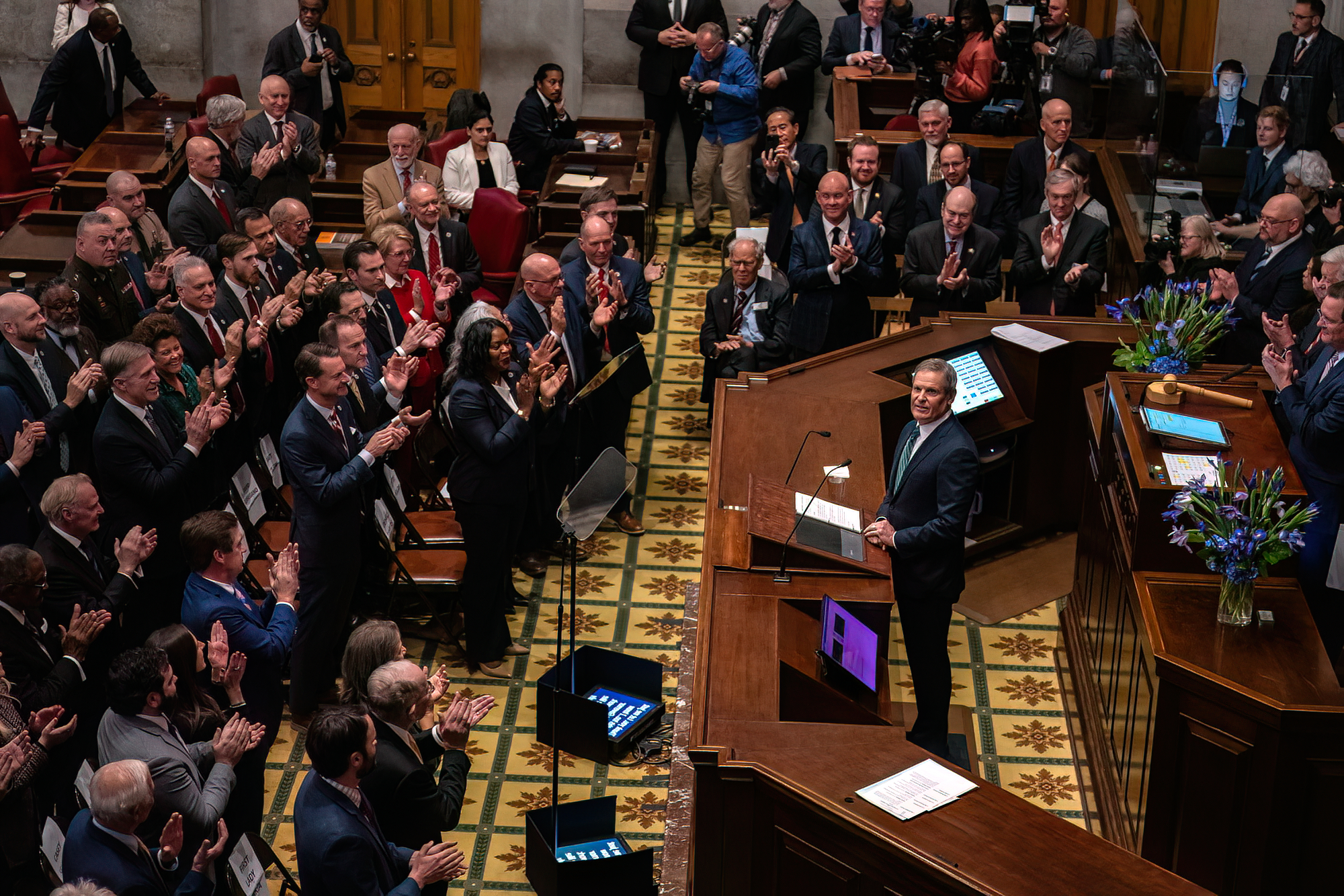
Conservation
- $100 million to execute a comprehensive regional water resource plan to ensure long-term water needs are met while protecting the ecological health of the Duck River
- $52 million to create five new Tennessee State Parks, with the goal of funding a total of eight new state parks by the time Gov. Lee leaves office, setting the Tennessee record for the most state parks created by one administration
- $6.2 million to address maintenance needs at Tennessee State Parks, preventing a backlog of deferred maintenance
- $40 million for environmental cleanup, including creation of a comprehensive water resource management plan in the Duck River region, state water revolving fund projects and electric grid enhancement
- $30 million to aid Tennessee Wildlife Resources Agency’s capital outlay and maintenance needs
Agriculture
- $25 million to create a Farmland Conservation Fund
- $20 million in additional funding for the Agricultural Enterprise Fund and Agricultural Enhancement Fund, both of which are utilized to aid Tennesseans in creating and expanding agricultural, food and forestry businesses and make long-term strategic investments in rural communities
Energy
- $50 million to create the Small Modular Reactor (SMR) Grant Fund to support Tennessee Valley Authority’s Clinch River Nuclear SMR project to position Tennessee as a leader in next-generation nuclear energy
- $10 million further investment in the Nuclear Energy Fund to attract advanced nuclear technology companies
- $2.6 million to develop the nation’s first regulatory framework for commercial nuclear fusion power
- $10 million further investment in Governor’s Investment in Vocational Education (GIVE) to support nuclear workforce education, as recommended by the Nuclear Energy Advisory Council
- $20 million for the Federal Grant Matching Fund, to support proposals from Tennessee universities and businesses applying for research funding from federal agencies like the National Science Foundation and Department of Energy
